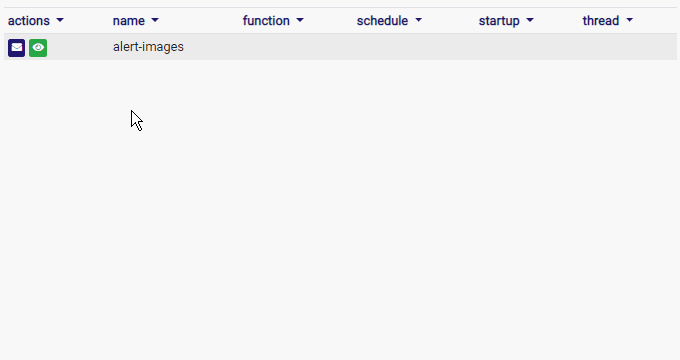Gramex 1.54 release notes
Admin UI features alerts and schedules
The Admin UI features 2 new tabs for schedules and alerts.

Admin UI for Schedule
The Admin UI for Schedule tells you which schedules will run when, and lets you manually trigger them. This is useful to test schedules, and to run them on demand.

Admin UI for Alert
The Admin UI for Alert tells you which alerts will run when, and lets you preview the emails as well as manually trigger them. This is useful to test alerts, and to run them on demand.


Admin components URL changed
This is a breaking change. If you use the admin page with components using JavaScript, the URLs have changed. You should:
- Replace
admin/userswithadmin/users-data - Replace
admin/webshellwithadmin/webshell-data - Replace
admin/infowithadmin/info-data
For example:
// This works before 1.54, but NOT from 1.54
$(".users").formhandler({ src: "admin/users" });
// Replace it with:
$(".users").formhandler({ src: "admin/users-data" });
LanguageTool app
Gramex bundles LanguageTool – a proofreading application that can correct grammar automatically. This can be used to improve the auto- generated wording from natural language generation. For example:

Learn more about how to use LanguageTool in Gramex
New data formats
Gramex can now read from Feather and Parquet files.
Feather
Feather is a data format that can be used to exchange data between Python, R, Julia and other languages. It is extremely fast, and is authored by Wes McKinney (author of Pandas) and Hadley Wickham (author of ggplot2). On their machines, it reads data at 600MB/s.
To read a .feather file, just use gramex.cache.open("data.feather"). Or on
FormHandler, use url: data.feather.
Parquet
Parquet is an efficient data format to store columnar data in Hadoop. It is supported by Spark, Hive, Impala, and other services. It can be used for data storage as well as data exchange.
To read a .parquet file, just use gramex.cache.open("data.parquet"). Or on
FormHandler, use url: data.parquet.
JSONData
JSON files are normally read by Gramex using json.load(), which returns a
list or dict. However, JSON is also used to store DataFrames. For example:
[
{ "name": "Alpha", "age": 50 },
{ "name": "Beta", "age": 40 },
{ "name": "Gamma", "age": 30 }
]
Gramex can now read JSON files as Pandas DataFrames if they have an extension
.jsondata. These can be processed by FormHandler like
a CSV or Excel file.
FormHandler parameters
FormHandler now allows substitution of any kwargs with the URL query parameters and path arguments. This opens up many interesting possibilities.
For example, you can browse an multiple sheet files with multiple sheets via a single REST API. For example, if you have a list of Excel files…

… each with a number of sheets…

… then a configuration like this:
url:
excel-files:
pattern: /$YAMLURL/(.*?)
handler: FormHandler
kwargs:
url: "$YAMLPATH/{_0}.xlsx" # This is picked up from the pattern (.*?)
sheet_name: "{sheet}" # This is picked up from the URL ?sheet=
… then the URL /file1?sheet=Sheet1 displays contents from file1.xlsx
showing data from Sheet1. The user can pick any file or sheet from this
folder.
This is also useful to pick table names from the URL path or query parameters.

FormHandler creates tables with primary keys
FormHandler has the capability to create tables automatically when a table is inserted. Now it creates the tables with primary keys defined as per the configuration. For example:
formhandler-data:
pattern: /$YAMLURL/data
handler: FormHandler
kwargs:
url: mysql+pymysql://root@$MYSQL_SERVER/DB?charset=utf8
table: sales
id: [city, product]
When you POST a row into /data, the sales table will be auto-created, with
columns as per the row, with city and product as primary keys.
Statistics
The Gramex code base has:
- 18,657 lines of Python
- 3,739 lines JavaScript
- 10,458 lines of test code
- 80% test coverage
How to upgrade
To upgrade Gramex, run:
pip install --upgrade gramex
pip install --upgrade gramexenterprise # If you use DBAuth, LDAPAuth, etc.
gramex setup --all